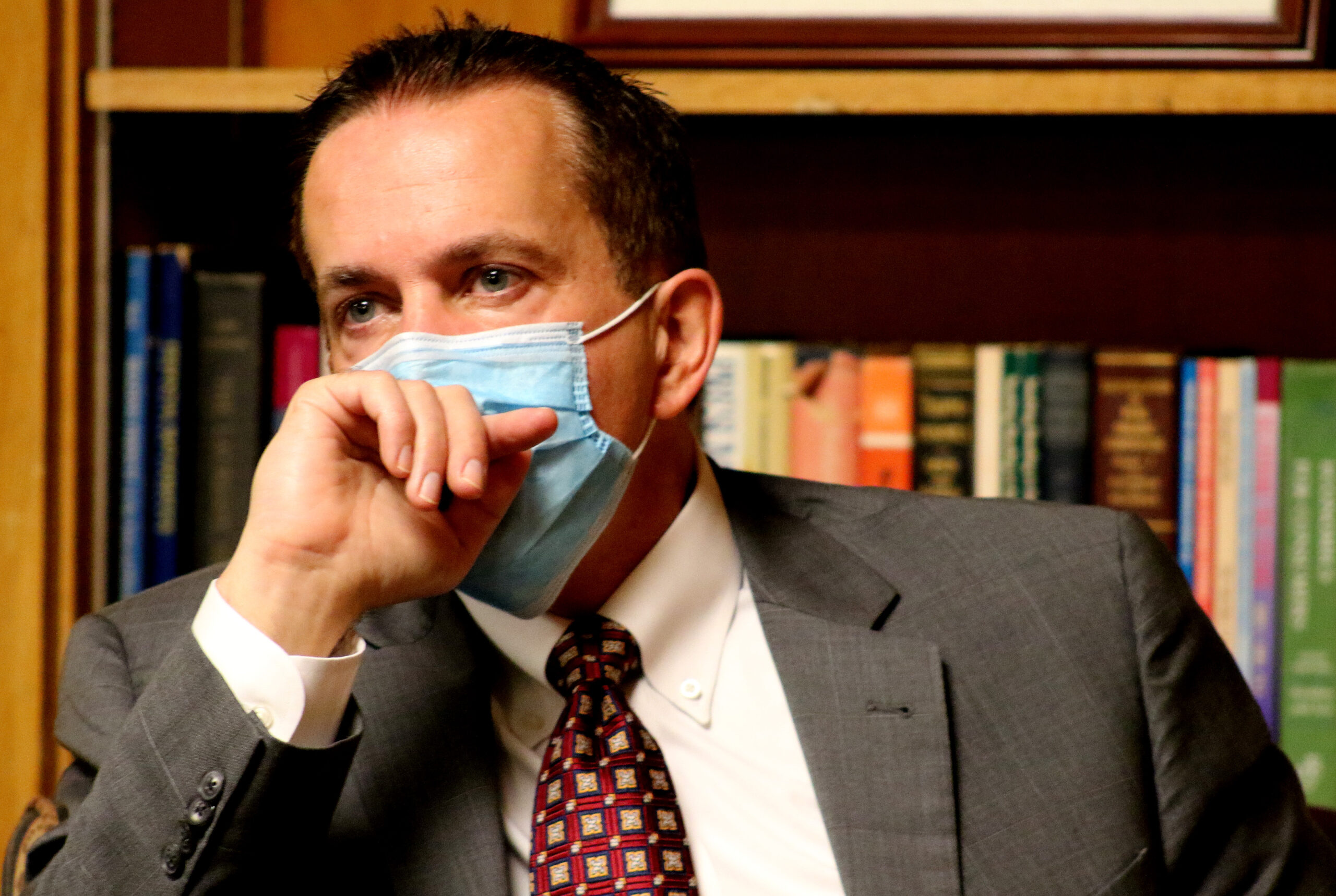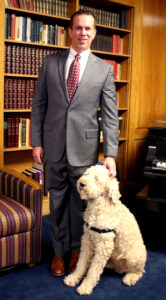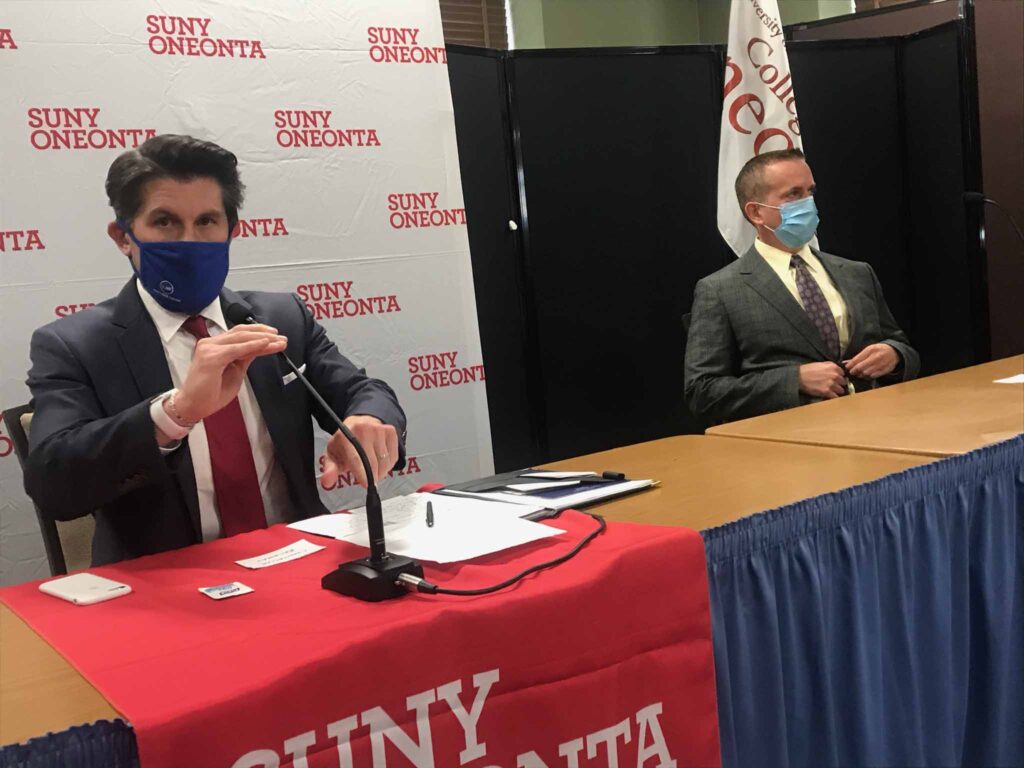EXCLUSIVE INTERVIEW: DENNIS CRAIG
MAN of THE HOUR
Can Hero Of Purchase
Save SUNY Oneonta?

By LIBBY CUDMORE & JIM KEVLIN • Special to www.AllOTSEGO.com

ONEONTA – For SUNY Oneonta’s interim President Dennis Craig, 55, it’s all about how you react to a crisis.
“In tough incidents, sometimes you’re more defined by your response than by the incident itself,” he said, whether cheating, an instance of bias, a suicide, even a murder.
When that happens, “I’m all about transparency and giving people more information, and letting them decide what they need to know,” he said in his first local interview since arriving on campus Thursday, Oct. 15.
SUNY Chancellor Jim Malatras picked Craig to succeed Barbara Jean Morris, who resigned after COVID-19 raged out of control at the local campus, infecting more than 700 students, more than on any campus in the nation.
As interim president at SUNY Purchase, Craig “pivoted” in March, closing the campus and shifting to remote learning. In the end, only 25 students on the 4,200-student campus in Westchester County tested positive.
A native of Merrick, Long Island, Craig jokes he is the “black sheep” of the family: Three generations were firefighters – father Thomas Richard; grandfather Thomas Aloysius and great-grandfather Peter Thomas – and several siblings and cousins were police officers.
“I’m a first generation college student,” he said – and a SUNY alum, attending Plattsburgh State.
His degree was in business, and he graduated into the stock market crash of 1987. He joined the Waldorf-Astoria Hotel in human resources, and was advanced to international management training, handling employment visas and training scheduled for European hotel schools.
Thinking he might become a teacher, he obtained a masters in history at Fairleigh Dickinson University, then a certification from Harvard’s Institute for Management & Leadership in Higher Education.
By 25, he was Fairleigh Dickinson’s director of Admissions & Financial Aid, using his international management training in recruitment. “I felt like I was being useful,” he said. “Everyone wanted to come here and learn American ideals, and I was honored to serve as an ambassador.”
Soon, he was associate dean of enrollment services at NYU’s College of Dentistry, senior director of administration & operations at Pace University’s World Trade Institute, and director of admissions at the Culinary Institute of America, with a staff of 31.
There, with the Conrad Hilton Library and the General Foods Nutrition Center, “I learned just how important alumni are to a school,” he said. “They are your connections within the industry, especially someplace like the Culinary Institute – that’s where the titans of industry go to train professionally.”

He joined Montclair State University as director of admission just as President Susan Cole determined to increase enrollment from 12,000 to 18,000 students. “Timing is everything,” he said.
“I’ve always had a very special place in my heart for colleges that start out as normal schools,” he said. “Because our students are always teaching, whether it’s in front of a classroom or in their business career.”
He joined Purchase in 2006 as VP for admissions and associate provost for enrollment, a newly created position. Early on, he put together a crisis management team, providential, in turns out: It got him thinking about problems before they happened.
As a vice president, “I was part of a larger ensemble team and got to learn about everyone else’s work,” he said. “At the cabinet meetings, you would see how the pieces – strategic, facilities, capital plans – all fit together.”
He successfully built a marketing and communications team, revamped the college’s website and oversaw the creation of an enrollment services program, which helped cut through the “red tape” around student services.
“The kind of students who need help getting an internship or studying abroad are the least likely to ask for it,” he said. “They have practical minds, focused on meeting their basic
needs, they may not have the inspiration from home or their peer groups.”
When President Thomas J. Schwarz retired, Craig was tapped to serve as interim president for the 2019–20 academic year, soon facing the biggest challenges of his career.
“I tend to be paranoid,” he said. “One too many pandemic movies. But with the super-spreader in New Rochelle, with one person causing 50 cases, the sense of panic and fear in Westchester was overwhelming.”
He monitored the situation until March, trying to give faculty time to prepare to go to remote classes. “With the acceleration of cases, we couldn’t wait that extra week,” he said. “I even wish I’d closed a week earlier than that.”
SUNY Purchase was the first of the SUNY campuses to “pivot,” as he puts it, to remote learning, even amid skepticism statewide. “It was like being in a parallel universe,” he said. “People were acting like being 100 miles away, they’d be immune.”
But his “paranoia” paid off – when he left the Purchase campus, there were only 25 total cases.
When students returned to campus in the fall – only 950 of them to keep housing densities low – surveillance testing was implemented, and students in the same programs were grouped together – that way, if there was a cluster of cases, the program could go remote, rather than the whole school.
“Not doing anything wasn’t an option,” he said.
On campus for just over a week, Craig has already spoken twice with Mayor Gary Herzig and began putting together a COVID task force, which met for the first time on Friday, Oct. 23.
“I’m on a listening tour,” he said.
“At this stage, I’m doing more listening than talking.”
The task force will bring back their recommendations in three weeks, which will help him shape the possible Spring 2021 reopening.
“We know that parents are an untapped resource,” he said. “They want to help, but they need more information. How we communicate is key.”
He’s already proposing weekly broadcasts and frequent “town hall”style meetings that would routinely bring the campus community up to date. “We want to button it down and clarify so people know what to expect,” he said.
When the students return, he also plans to institute “office hours” so students can reach out to him – or just say hi to his dog, Beckett.
“He’s an excellent ambassador,” he said. “The first thing students say when they see him is, ‘I miss my dog.’”


“The Hero of Purchase”? Puh-LEEZ!
While I wish the new acting President luck in his endeavors, could we please put the brakes on comments such as those found in the headline of the article? This man is not a hero. Apparently he did a good job at Purchase and he’s to be commended for that but that’s all. Let’s not get carried away.